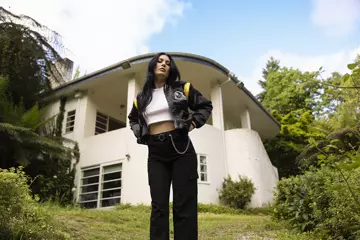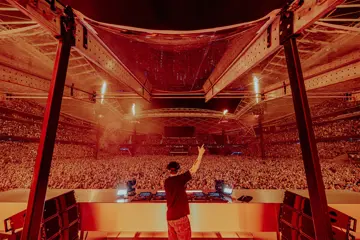Kate Grenville's novel The Secret River follows the conflict between two families — one white, of convict stock, and the other of the Indigenous Dharug people, whose land is being taken away from them.
Andrew Bovell's stage adaption of the novel — Andrew Upton and Cate Blanchett's first commission for Sydney Theatre company — was a sold out success during its debut run in 2013. It now returns for an encore season, starting at the Roslyn Packer Theatre before heading to Brisbane's QPAC and Melbourne's Arts Centre.
"I'm really thrilled we're doing it again. I'm really proud of this production and I'm glad that it gets an audience. And being from Melbourne, it's wonderful to be able to take it down there," says actor Nathaniel Dean, who portrays protagonist William Thornhill.
"I find a lot of people actually don't know where they're from — they have a very broad history of, 'Oh, well I'm a convict, I come from a convict heritage' ."
"We're in our second week at the moment, and it's a big undertaking to remount it. But it's got a huge life, this show, and what Andrew and Neil [Armfield — director] have created is something really special. I think the set is incredible — Stephen Curtis's set, Mark Howett's lights, Tess Schofield [costume designer] — and we've all kind of leapt together. And there's live music on stage, so the whole thing is one organic thing — so there's actors playing different musical instruments... there's no recorded sounds, if you like, so what you watch unfold in front of you is being performed by everybody on stage, so I think it is a genuine theatrical experience."
Don't miss a beat with our FREE daily newsletter
The play won six Helpmann awards and garnered reviews that not only praised it on its merits as a piece of art, but also discussed it in a social and political context. It's impossible to ignore the topics of colonisation and invasion when you're seeing the story from the affected side.
"Well, it started a conversation and I think that we in the arts need to continue this conversation because [it] needs to be resolved in some manner, and I feel in the past three years there's been moments still — well, we need to reflect on where we've come from and who we are and more importantly where we want our nation to go. I think the play is accessible; it is challenging but, yeah, the conversation is probably what I remember the most," Dean says of the play's initial run.
"I find a lot of people actually don't know where they're from — they have a very broad history of, 'Oh, well I'm a convict, I come from a convict heritage' but they maybe don't know much more than that. And I find that compared to 40-odd thousand years of history and stories being passed down, you know, that's one of the things we need to reflect on as well — we can't just ignore those stories."
Bovell's adaptation and Armfield's direction have given more space for the Dharug characters' perspectives to be seen and heard.
"When we originally constructed it, that was a major thing that Neil wanted to give life to, was these voiceless people. And I think... not speaking for Kate [Grenville], but I believe that she wrote about what she knew about, so for her, she did this very authentic tale of that."
The Dharug language is even incorporated into the play, which Dean says was "a major thing and a tough undertaking to research and then make happen".
"I think we all feel an enormous sense of duty and care when it comes to telling these stories — care from the convict side or the Dharug side. When you're dredging up these stories, out of respect to all those people, we're trying to show... this is a theatrical telling of this story. There's not a rehearsal or a show that we'll go through where we don't all get together as a group of people and we all breathe as one... we are all telling this story, we're not the perpetrators and we're not the victims, but we're trying to do justice to something that did actually happen, and, you know, the weight of that does bear down on you, but when you're with a group of people, we're storytellers and we stand as one up there telling this story. We respect each other and there's a lot of trust up there and we're giving it our whole guts and heart, as we say!"
If Dean could ask one thing of the theatre-goers who see The Secret River this time around, it would be to take the time to reflect on it, and acknowledge our land and how we got to be here. "Maybe they [can] look into who their family is and where they're from, and more importantly what happened back then, and who these people are."















